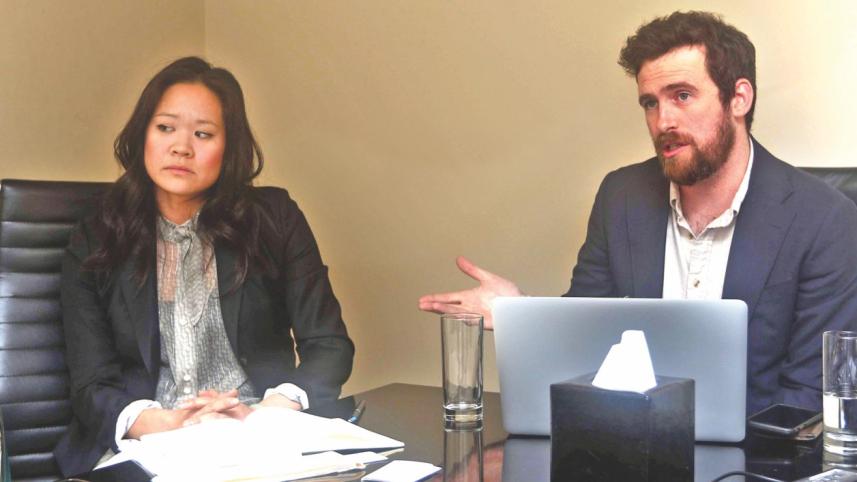BB must open up mobile money policy: analysts

The central bank should open up its policy on mobile money services led by banks, and give such licences to other types of entities to expand financial inclusion in Bangladesh, said a top official of the Bill and Melinda Gates Foundation.
Lynn Eisenhart, a senior programme officer at the Foundation, said it will be a difficult task for the central bank to bring new entities under financial regulation, but it is needed to make the most of financial inclusion.
There is huge scope for growth of financial inclusion in Bangladesh and that is why they are working with the regulators and the government, said Eisenhart and Nat Kretchun, associate director of InterMedia, in a joint interview with The Daily Star last week.
"We think the central bank needs to find a way to potentially begin licensing other types of entities, not only banks," said Eisenhart, commenting on the central bank's draft policy on mobile financial services.
She said they have observed a level-playing field in licensing in different countries, but it is not an easy task.
The two leading experts said social barriers as well as educational and technical challenges have pushed Bangladeshi women away from being financially included, though the country achieved tremendous financial inclusion at around 43 percent.
"The largest number of low-income women lives in this subcontinent and a huge number of them are not financially included," said Eisenhart.
Men enjoy three times the growth in financial inclusion than women -- 13 percent of men use mobile money, while it is only 4 percent for women, according to a study based on statistics from 2015 and conducted by Washington-based research company InterMedia with funding from the Bill and Melinda Gates Foundation.
Launched in 2000, Bill and Melinda Gates Foundation is said to be the largest transparently operated private foundation in the world.
The internationally reputed organisation also gave feedback on the draft guideline prepared by Bangladesh Bank where it allowed a minimum of seven entities to form an MFS consortium.
In the urban segment, 13 percent of citizens were using mobile money in 2015 and 7 percent in the rural areas.
A gap in the ownership of technology, like mobile phones, has also created a barrier for people from being financially included, said Kretchun.
In the study, Kretchun said 79 percent of adult men in Bangladesh use mobile phones, while it is only 40 percent for women.
"When a person has a mobile, it creates an opportunity to use mobile money services and that might be the main reason for this gap," said Kretchun.
In India, the gap in the use of mobile phones between men and women is 31 percentage points, 40 percentage points in Pakistan and 39 percentage points in Bangladesh.
The gap is 10 percentage points in Kenya and 11 percentage points in Nigeria in 2015.
Overall, Bangladesh's financial inclusion expanded 8 percentage points year-on-year in 2015, driven by growth in mobile money, to 43 percent and the Bill and Melinda Gates Foundation expressed satisfaction about it.
"We found a positive result in financial inclusion, mainly driven by mobile money, and there is huge room to grow as well," said Eisenhart.
There were 3.9 crore registered mobile financial service accounts in Bangladesh until October this year, with only 1.38 crore active ones. Transfers worth Tk 20,692.43 crore were made in 12.85 crore transactions in October alone, according to central bank statistics.
Of total transactions in 2015, 82 percent went through bKash; while 9 percent of users used other mobile money channels in addition to bKash, said the study -- Financial Inclusion Insights.
Eisenhart said they are working with the regulators and the government to break the monopoly in this segment.
"To potentially increase competition, we have already placed some recommendations with the Prime Minister's Office and the central bank."
Around 92 percent of adults were aware of mobile money in 2015 and 33 percent of them are using the service, and there lies the potential, they added.
On suspicious transactions, Eisenhart said both the operator and the regulator should work together and regularly monitor the transactions and take action.
Not only Bangladesh, but other countries are facing the same problems and they are taking action as well, Eisenhart added.
Industry leaders should also regularly run campaigns to make users register their own phones for mobile money and to educate them, instead of using agents for transactions, said Kretchun.
Eisenhart said: "Lower income people get access to financial services due to mobile banking. The cost of mobile banking in Bangladesh is among the lowest in the world that mainly attracted these low-income people to have accounts with these digital services."
Both the Bill and Melinda Gates Foundation and InterMedia ran the same study in India, Pakistan, Uganda, Kenya, Tanzania, Niagara and Indonesia as well.
For the survey in Bangladesh, they interviewed 6,000 people, which is a good representation out of an adult population of 13 crore.



 For all latest news, follow The Daily Star's Google News channel.
For all latest news, follow The Daily Star's Google News channel.
Comments